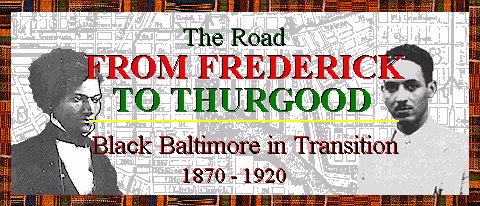 | Everett J. Waring:Education, Law and Business Careers |
 | Everett J. Waring:Education, Law and Business Careers |
Reverend Harvey Johnson urgently needed a lawyer. He needed a talented African American lawyer who was willing to move to Baltimore and help put an end to a long, hard-fought battle. Johnson, a community activist and civic leader, had joined with other prominent African Americans to fight the section of the 1864 Maryland constitution barring black lawyers from practicing in the state courts. This law had been challenged unsuccessfully several times since 1864 on the grounds that it violated the fourteenth amendment to the Constitution; a breakthrough came on March 19, 1885. Sponsored by the Mutual Brotherhood of Liberty, a lawyer named Charles S. Wilson applied for admission to the bar of the Baltimore City Superior Court. The court rendered an unprecedented, unanimous decision that "color alone would never bar a person from receiving justice within its limit and jurisdiction." The judges decided that Wilson was not fully qualified for admission, but the way was clear for one who was: enter Everett J. Waring. Johnson rushed to Howard University to convince Waring to come to Baltimore and make history. On October 10, 1885, Waring did, becoming the first African American lawyer admitted to the bar of the Maryland courts. Several others followed immediately in his wake, and the flow has continued steadily to the present day. Waring later applied to the Maryland State Court of Appeals in Annapolis, and was admitted on April 17, 1888. [2]

Waring decided to remain in Baltimore after his historic achievement; undoubtedly, he recognized that the African American community in Baltimore would provide both the opportunities and the social support necessary for his career to flourish. His law office was located at 217 Courtland Street, and he soon was "well known in Baltimore legal circles, where he had a lucrative practice among the colored population." In 1887 he was admitted to the Maryland Court of Appeals in Annapolis. Waring's most celebrated case was his defense of Henry Jones, one of eighteen black men accused of murder in the Navassa Island riot of 1889. The men were working on the tiny, uninhabited island extracting guano deposits for the Quaker Company when a riot ensued and five of the eleven white officers present were murdered. Eighteen men were extradited to the United States for trial. Waring challenged the jurisdiction of the United States over the island, taking the case all the way to the Supreme Court. The Court ruled that, because the island had been discovered by an American citizen, the U. S. courts indeed had jurisdiction. Jones was later found guilty of first degree murder. [3]
Waring was an active real estate dealer, owning as many as forty houses at one time. These houses were located in the area of Division, Etting, Baker, and Mosher Streets. Waring mortgaged all of these homes with various building association companies. When the Lexington Savings Bank failed, these companies took out numerous equity cases against Waring in Baltimore City Circuit Court because most of his mortgages were not yet paid off. [4]
Waring first gained editing experience in Ohio, where he established and edited the Afro-American. He also edited the Sunday Capital, a newspaper in Springfield, Ohio. Upon his arrival in Washington D. C. in 1882, he did newspaper work in addition to his law studies. When Waring moved to Baltimore, he became editor of the Star, a local paper geared toward the African American community. [5]
![]() Returnto Business & Industry Introduction
Returnto Business & Industry Introduction
![]() Returnto The Road From Frederick To Thurgood Introduction
Returnto The Road From Frederick To Thurgood Introduction
|
Tell Us What You Think About the Maryland State Archives Website!
|
© Copyright December 02, 1998 Maryland State Archives